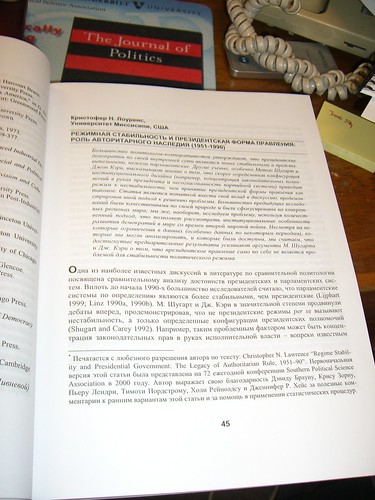Sully on Obama’s conversion to speaking truth to power douchebags:
It’s extremely depressing that the first major national black politician who takes on the victimology of Sharpton and Jackson is greeted by the right with the kind of cynicism you see at Malkin or the Corner or Reynolds. It reveals, I think, the deeper truth: the Republican right only wants a black Republican to do this. They are not as interested in getting beyond the racial question, in changing the hopes and dreams of black America, as they are in exploiting it for partisan advantage. Their response to the first major black candidate for president tackling the old racial politics? “We don’t believe him.”
To my mind, the “cynicism” is warranted (and, by the way, it’s a cheap shot to lump Glenn Reynolds—who has spoken very positively of other black Democrats, like Harold Ford—in with the Corner crowd and the odious Michelle Malkin) because, fundamentally, the question is which Obama is genuine. He’s spent two decades in Jeremiah Wright’s pews, and there are two plausible interpretations of that: he sat there all that time thinking “bullshit, bullshit, bullshit” while Wright preached his nonsense about CIA conspiracies to infect blacks with AIDS and spread crack in the inner cities and was being politically expedient in using that as a platform for reaching out to a black community skeptical of his African-American bona fides as a half-white, half-black-but-not-black-American politician, or he’s being politically expedient now reaching out to whites and Hispanics who are rather more troubled by Wright’s bullshit (and the related bullshit spread by Sharpton and Jackson) than he genuinely is. Neither interpretation squares well with the Sullivanesque interpretation of Obama as the Great Black Hope who will unite all the races in the quest for the one ring to rule them all, or at least a quick exit from Iraq or something.
That doesn’t necessarily mean that Obama is a bad person or isn’t telling the truth now; hell, even if he is a liar on this one issue he’s still an order of magnitude more genuine a person than Hillary Clinton, who skillfully combines all of her husband’s artistry for compulsive dishonesty with none of the used-car-salesman charm that made it at least vaguely palatable. But it’s somewhat harder to square Obama the presidential candidate with Obama the inner-city politician than it is to square, say, Ford, who never had to pander as much to the black establishment (in large part because of his father’s coattails) before becoming a DLC-style centrist in Washington.
Update: Timothy Sandefur makes largely the same points, but far more eloquently (particularly with 100% fewer uses of the word “bullshit”), while Johnathan Pierce at Samizdata critiques another part of Sullivan’s argument.
![Welcome to Signifying Nothing [Signifying Nothing]](/local/memlogo-1.png)

